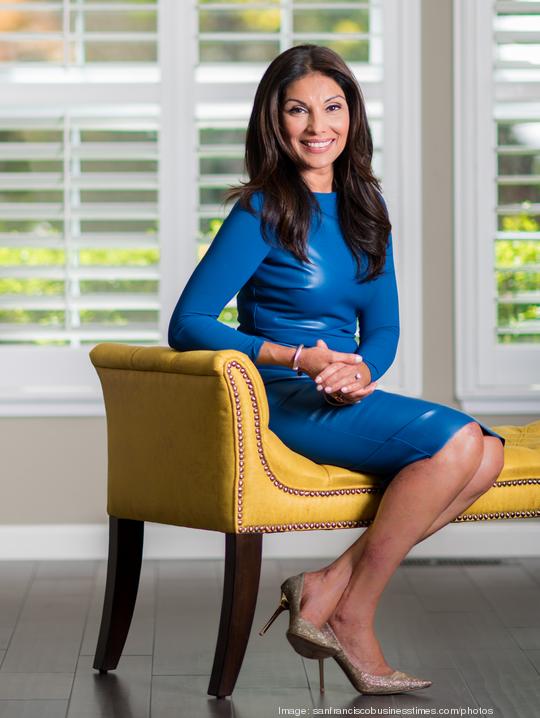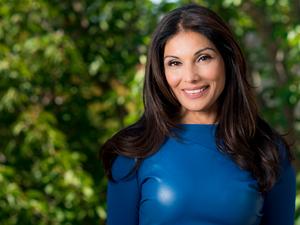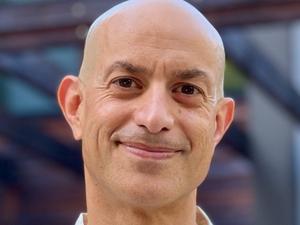
A trained programmer, Shelly Kapoor Collins worked at Oracle for a decade before starting her own software company providing tech solutions for public sector clients. That experience led to new opportunities including advising political candidates — from Kamala Harris to Barack Obama — on tech issues. She has also served on state and federal taskforces and councils related to small businesses and women. Now she's a partner at Sway Ventures, a venture capital firm based in San Francisco. In 2017 Collins also founded her own firm, the Shatter Fund, which invests in startups led by female founders.
Last year, the Shatter Fund surveyed female-led companies about the challenges they were facing during the early days of the pandemic. Very few of the respondents said their businesses had to shut down but half said they had less access to capital, and strains on mental health and homeschooling children were two of the biggest challenges that businesswomen faced. The Business Times talked to Collins about why women still get the short end of the stick when it comes to funding, the importance of representation in venture capital and how the Shatter Fund is trying to create opportunities for young women starting as early as high school.
Why did you start Shatter Fund? I'm a programmer. So, everything I've ever done has been through the lens of tech. Technology is an equalizer, it makes the world better. It's actually magic. You can be anyone from anywhere and you can have an idea and a laptop, and if you have an education rooted in tech or STEM, you can literally do anything. But without women in tech and STEM careers, there's not much equality there. The key barriers for women in tech roles have been a lack of access to capital, networks and markets. I was at Oracle for 10 years. I started my own business with the advice of then-District Attorney Kamala Harris, and then she invited me to be a tech advisor to her attorney general campaign. That led me into political tech. She introduced me to Barack Obama and his reelection campaign. All of these were the stepping stones to starting the fund. During Obama's second administration, I was appointed to the SBA and I was appointed to the National Women's Business Council where we did research into why weren't more women starting businesses? What are the prohibitive factors? How do we help them? I knew the private sector would be the most critical piece of this and that's when I started the fund.
You've talked about how women-led companies generate more revenue and bigger valuations, so where's the disconnect? There's a direct link between innovation and diversity which leads to greater returns. Full stop. However, there is not much awareness. Women are still seen as a charity as opposed to a returns-driven proposition. Investing in diverse founders has 66% greater returns versus all-male led teams. Because you bring in that diverse lens, that different way of thinking that creates a solution for all, not just a select few, which leads to greater sales, greater capture of consumers and greater returns.
Women make up half the population. And you know what else? By the year 2028, we'll control 75% of discretionary spending worldwide. We are the No. 1 consumers and the No. 1 decision makers in our households. So, to not have solutions designed for us does not make sense.
You also served on Governor Newsom's entrepreneur taskforce for the bulk of the pandemic. What did you do there and has anything improved? The focus was on all small businesses in dilapidated areas, places where they couldn't get access or visibility. Our work during the pandemic on that taskforce was the most impactful at the right time. We were able to get some of these businesses to provide goods for PPE from glasses to hospital wear. It was a really interesting time to be on that taskforce, not necessarily because of what we intended to do but what we ended up doing driven by the pandemic. Have things improved? I think they continue to improve. Small businesses are getting out there. They have more visibility, and the plight of small businesses is more acknowledged.
Thinking about female founders and business owners, do you have any advice for women who have a business idea but don't know where to start? I have lots of advice (laughs). There are different stages. I have people in my circle who are constantly saying, just put pen to paper, start working on it. You don't even need a whole business plan, just give me some ideas and where you're trying to go. Then find a mentor and ask them to connect the dots for you. The number one thing is to just start. The worst thing you can do is not act on it. You can always get a job, but you won't get the time back to go and fulfill your dream.
Women also make up a small fraction of investors and venture capitalists, too. Why is it important to have representation on the investing side, as well? When there is a female investor involved in the decision-making process, a female entrepreneur is 2.5x more likely to get the capital that she needs. The other part of it is, we see things differently. Glam Squad is an on-demand hair and makeup company. I went to them and said, look, I can help you guys. I can take you into Washington where I'm super connected and I can launch you at the White House Correspondents Dinner. We'll do hair and makeup for free for all the journalists. We'll give them a first-hand experience, and boom, you will be launched in the heart of politics where women want their anonymity and get hair and makeup done without going to a salon. A male counterpart said to me, “I'm not seeing the connection between hair and Washington.” He wouldn't because he's not the customer. We are the customer. The people who need the service are the one's who are able to see the solution. This is why we need more women decision makers to fund those businesses and why we need more female entrepreneurs to create those businesses.
We have different needs. 1000%, exactly.
Can you talk about your own background in tech? You worked at Oracle and started your own business. I started off as a programmer. Then I was recruited by Oracle for their Government, Education and Healthcare practice in 1998 and I stayed with Oracle for 10 years. I implemented their back-office solutions. It was so unsexy then and it's all being disrupted now. HR, payroll, time and labor, benefits. And that's what I think put me onto the path of what I'm doing now. I was implementing software at the intersection of policy and got to know regulations and HIPAA and what the requirements are in the GSA.
Is there anything else you'd like to add? As women, we are part of a sisterhood and wear multiple hats. We're the best multi-taskers, and one of the most important hats I wear is that of being a mom. As a mother to two kids, I want to set an example for them of what's possible. And I can't overstate the importance of being that door opener for other women, no matter how much you have going on at home, no matter what you're doing. Being a door opener, not a gatekeeper, for other women.
Tell me more about the Shatter Foundation, too. Earlier this year we announced the Foundation which brings entrepreneurship education to young girls in underserved communities. This summer we held our first online cohort. We took 30 girls from around the country thanks to Zoom, and they walked away with Shatter ambassador certificates and a resume builder. They're in touch with each other and they know what it's like to start a company. Hopefully they retain that. That was high school girls. Next, for college-age girls we're giving away grants for students who are on the precipice of building their company, mostly in tech.
It really does start young. Boys are taught to be creative and inventive in ways that girls aren't from a young age. Boys are taught to be president and girls are taught to play with dolls. That’s a discrepancy starting super early. In the third grade, girls especially start to say things like, math is just not my subject. Then by eighth grade, they're really not interested in it, and by the time they start going into college, fewer girls go into engineering, computer science and information systems. Those norms are a big part of what causes the drop of girls and women in tech. It's not a pipeline issue, it's really an education issue.
The Deets
Residence: Silicon Valley and DC
Hobbies: Pilates, walking and working out
Reading: My Life in Full by Indra Nooyi and Wise Women by Joyce Tenneson, which was a gift from my dear friend Catherine Zinn.
Watching: Season 3 of Succession
Education: University of Maryland, College Park and studied Management Information Systems for BS and MS degrees
First investment: Hello Alice, a platform for small and medium businesses founded by two women.
Most proud of: I'm proud of starting Shatter Fund, taking it from a phrase and turning it into an actual venture fund. It was one of the hardest things I've ever done, harder than giving birth without an epidural. I'm really proud of sticking with it and getting through the tough times.





